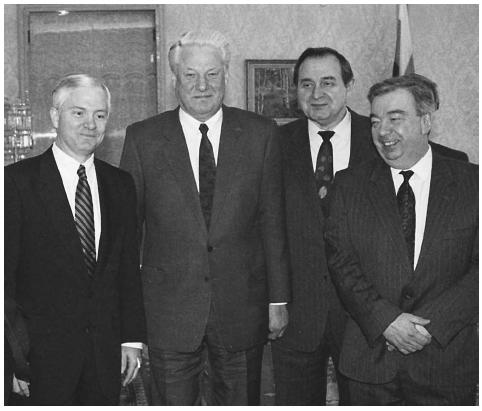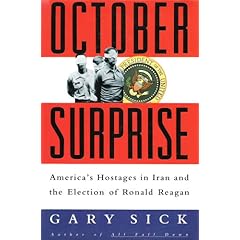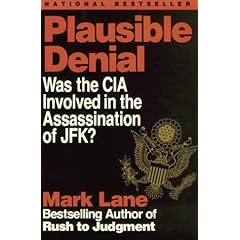Gates of Ivory: Langley Overshadows the Pentagon

There is much more than meets the eye regarding the appointment of Robert M. Gates. While the media has trumpeted the obvious fact that he has served under six presidents, he has actually served under some of the most pivotal Directors of Central Intelligence in American history, beginning with Richard Helms and ending with William Casey (under whom his career became meteoric) then the relatively unobtrusive and ineffective William Webster and finally rising to the DCI’s office himself, the first entry level CIA employee ever to rise to the Director’s exalted chair.
Gates should be seen for what he really is – an Iran-Contragate fixer and a champion of the US intelligence apparatus. His appointment is – in a broad sense – a victory of Langley over the Pentagon in the formulation of the Middle East military agenda.
This vivid portrait by Michael Carmichael of the Planetary Movement constitutes a sketch of some of the most salient factors in the biography of Robert M. Gates.
His commitment to the Bush dynasty is well-known, and his function will be to preserve what little is left of its historical credibility. In accomplishing this objective, he will use his immense talents and knowledge of the US intelligence community to suppress any derogatory information. Another way of describing his core assignment is as a “coverup”. This you and I – and millions more – know, very well.

(Two former Directors of Central Intelligence: George Bush, Sr. and his long-serving acolyte and protege, Robert Gates.)
One week to the day after the devastating midterm elections in America that repudiated the Iraq War of George Bush, one hundred and fifty people were “kidnapped” from their government offices in Baghdad by gunmen dressed in the uniforms of police commandos.
Last night, Tony Blair advocated the enlistment of Iran and Syria in the resolution of the escalating war in Iraq. Blair’s recommendation echoed those made in October by James Baker and Lee Hamilton, the Co-Chairmen of the Iraq Study Group.
On November 14, President Bush met with Prime Minister Ehud Olmert. The two leaders have a great deal in common. Bush is deeply unpopular in America, while Olmert is even more unpopular in Israel. Both men are keen supporters of – not only the failing war in Iraq – but, of a plan to broaden that war into more nations in the Middle East. Both men wish to attack Iran in order to neutralize its nuclear facilities. Apparently, both Bush and Olmert believe that a military intervention against Iran would lead to a more stable, more responsive and more accommodating attitude across a broad spectrum of nations and cultures in the Middle East. Their problem is that fewer and fewer agree with them.

The highly anticipated findings of the bipartisan Iraq Study Group (ISG) seemed at first sight to offer a glimmer of hope. Baker and Hamilton would hold a regional conference including Iran and Syria. In addition, Baker and Hamilton – now bolstered by Blair – would have Bush pursue a “realistic dialogue” between Israel and Palestine – another noxious concept in the mind of the lame-duck president.
Amidst all of this post-election kerfuffle, the Baker-Hamilton group have revealed their true face. They have proposed that one of their number be elevated to replace the dastardly Donald Rumsfeld. Now discarded and abandoned, Rumsfeld is bracing to face a lifelong torrent of war crimes investigations and pursuit by what will become a stream of subpoenas calling for his cooperation in his prosecution for war crimes.
Into Rumsfeld’s shoes, Bush has thrust one Robert Gates, an erstwhile member of the Baker and Hamilton Iraq Study Group. Mr. Gates has been a critic of the war in Iraq. As a longstanding retainer of the Bush family and its political interests in the intelligence community, Gates’ appointment is now being hailed by the Republicans as a major step in the right direction.

In recent years, Mr. Gates has been ensconced in the academic community as first the Dean of the George Bush School of Government and Public Service based at Texas Agricultural & Mechanical College. Later, Mr. Gates was elevated to the presidency of Texas A&M. Although it was founded in 1876, Texas A&M was not admitted into the Association of American Universities until 2001, when its nomination was strongly supported by Rice University in Houston and the University of Texas at Austin.
Located at the City of College Station, Texas, Texas A&M is the site of the George Bush Presidential Library that includes a 600 seat Presidential Conference Center and the headquarters of the George Bush Presidential Library Foundation Office, the fund-raising arm of the institution to commemorate the presidency of George Bush, Sr. According to reports, the Bush Presidential Library is the official repository of the presidential – and pre-presidential – papers of Bush, Sr. Oddly, the Bush Presidential Library is also the repository for the gubernatorial papers of his son, the current President Bush – as well as the pre-gubernatorial papers of Bush, Jr. These papers include reports and correspondence pertaining to Bush’s previous businesses and investments concerning his controversial stock transactions that drew the attention of the SEC in the early 1990s. These papers are sealed – not accessible to public or professional scrutiny until dates far removed into the remote future.

(The George Bush Presidential Library at Texas Agricultural & Mechanical University, College Station, Texas.)
In addition to his duties at the George Bush School of Government and Texas A&M, Mr. Gates has a long career in public service. Joining the federal government in 1966, he spent most of his career in intelligence where he supervised analyses of human intel – ie. reports from CIA agents and CIA assets operating across the globe. One of his colleagues from those days in the 1970s and 1980s, Ray McGovern criticized Gates for cooperating with his politically appointed supervisors to “cook” intelligence analyses. Gates worked closely with William Casey, a former Director of Central Intelligence (DCI) who has been discredited for his involvement in the Iran-Contra Scandal. At the same time, Admiral Stansfield Turner, a former DCI has praised Gates as an excellent nominee to replace Rumsfeld.
In 1987, Mr. Gates was nominated by President Reagan and Vice-President Bush (Sr.) to the post of DCI. However, he withdrew his nomination when it became clear that the Senate would reject him because of his involvement in the Iran-Contra Scandal – a criminal conspiracy involving illegal sales of arms to the Islamic Government of Iran and the diversion of funds to support the death squad operations of the Contras – a right-wing fascist movement in Central America.
Later, during the presidency of Bush, Sr., Mr. Gates was re-nominated to the post of DCI, and this time he was confirmed. Mr. Gates assumed his post in November, 1991. Upon the inauguration of President Clinton, Mr. Gates retired from his post as DCI in January, 1993, having served for approximately 14 months – a brief period to be sure, but one that surpassed the term in the DCI’s office of Bush, Sr. who only served for a breathtakingly swift term of 11 months and three weeks, between the 30th of January, 1976 and January 20, 1977. The brevity of their terms as DCI is a strong bond between Mr. Gates and Bush, Sr.

(At the Kremlin in 1992, new DCI, Robert Gates with: Boris Yeltsin, Yevgeny Primakov, then head of the KGB, and Viktor Barannikov.)
Following his departure from federal employment, independent investigators have claimed that he was involved in direct negotiations with agents of the Islamic Government of Iran during the unpleasant episode that is described as the “October Surprise” conspiracy of 1980. This case had been described in detail by Dr. Gary Sick and by the controversial Ari Ben Menashe who describes himself as a former member of the security services of Israel. Robert Parry reports that Ben Menashe identified Robert Gates in direct negotiations with Iranian agents in Paris where the Republicans urged the release of the 53 American hostages should be delayed until after Jimmy Carter left the presidency in January, 1981. This case has never received the official attention that it deserves, and hangs like a void, a gap, a lacuna in the annals of American history. If these facts had been known during his confirmation procedure in 1991, it seems unlikely that Mr. Gates would have been confirmed as DCI.

Following his departure from the CIA headquarters in Langley, Mr. Gates accepted a series of appointments in the private sector prior to settling into his offices at Texas A&M. Mr. Gates has been a board member of the following corporations: Fidelity Investments; the North American Coal Corporation Industries (NACCO); Brinkers International; The Parker Drilling Company; Science Applications International Corporation and VoteHere.
Fidelity Investments is the well-known mutual fund management firm. NACCO Industries is a conglomerate controling Procter-Silex and Hyster Company, a manufacturer of fork-lifts. Brinker International owns Chili’s, On the Border Mexican Grill and Cantina, Maggiano’s Little Italy and Romano’s Macaroni Grill. With 1,500 restaurants worldwide and 100,000 employees, Brinker is the largest employer in the Dallas-Fort Worth metroplex with an annual turnover of $4 billion. The Parker Drilling Company owns offshore oil rigs and drills for other companies under contract. In this regard, it is a virtual mirror image of Bush, Sr.’s now defunct company, Zapata Petroleum, the colorful firm that was featured in the best-selling book by Mark Lane, Plausible Denial, where the author described in some detail Zapata’s connections to CIA operations in the Caribbean – including the Bay of Pigs – as well as its scope for operation from other locations as diverse as the Persian Gulf the Gulf of Brunei.

According to Bev Harris, the founder of Black Box Voting, Mr. Gates’ affiliation with VoteHere is one of the most fascinating episodes in his complex and illustrious career in private enterprise. According to Harris, VoteHere were a leading developer of cryptographic software for the electronic voting industry. Mysteriously, Harris reports that VoteHere apparently never sold any voting machines, but they sealed some deals to embed their cryptographic software into voting systems.
Compounding this commercial mystery, Harris reports that – in spite of VoteHere’s prowess in cryptography – its computer system was “hacked” and its proprietary source code was stolen. The details of Mr. Gates’ role in the promotion of VoteHere and the subsequent hacking episode are – at the time of this writing – unknown. It is also unknown whether the cryptographic products of VoteHere were in any way whatsoever vulnerable to the sort of unethical hacking that might permit the rigging of elections.
The public record is quite clear. Mr. Gates has a lengthy career inside of the federal intelligence establishment, as well as a distinguished career in a variety of American corporations dealing in coal, offshore drilling, fast food, computer cryptography for electronic voting and the manufacture of forklifts. Additionally, he has served faithfully as the Dean of the George Bush School of Government, the site of the top-secret repository of the George Bush Presidential Library and its foundation headquarters. Capstoning these accomplishments, Mr. Gates has been elevated to the post of President of Texas Agricultural & Mechanical University.
Today, Mr. Gates stands before America and the world as the nominee for the office of Secretary of Defense, that is only now being vacated by the man whom he hopes will soon be described as his predecessor, Donald Rumsfeld.
In the past, Mr. Gates has experienced a mixed result with the appointment process. Mr. Gates first difficulty came when he removed himself from consideration for DCI during the Iran-Contra Scandal. Four years later, he experienced success as the final, albeit short-term custodian of the DCI’s office during Bush, Sr.’s twilight campaign in 1992 when he was defeated by Bill Clinton.

Since his years of service with Bush, Sr. through the Reagan administration until his sterling work for the George Bush School of Government and Texas A&M, Mr. Gates has been in position to maintain and control the intelligence and privacy objectives of his senior patron. In fact, it would not be surprising if Mr. Gates was appreciated by Bush, Sr. and Jim Baker as a safe pair of hands to handle any embarrassing or derogatory information that might exist in any official government archive – anywhere – Langley, the Pentagon, any presidential library or elsewhere. Mr. Gates’ credentials in the field of cryptographic software suggest that he is in an ideal position to help maintain maximum levels of secrecy demanded by his patrons.
In classical literature, we learn from Vergil, the author of Aeneid and Metamorphoses, that dreams emerged into our world through two sets of gates – the gates of ivory and the gates of horn.
In classical times, when glass was unavailable horn was used for windows – since it was semi-transparent.
Dreams that are confusing, malevolent, meaningless and untruthful emanated through the gates of ivory – an opaque substance, while those few rare dreams bringing deep insights and profound revelation – came solely through the gates of horn.
In his Aeneid,* Vergil wrote:
“Two gates the silent house of sleep adorn;
Of polish’d ivory this, that of transparent horn;
True visions thro’ transparent horn arise;
Thro’ polish’d ivory pass deluding lies.”

*Translated by John Dryden, 1697.
Michael Carmichael is a frequent contributor to Global Research. He is a historian and author, and the founder and Chief Executive Officer of the Planetary Movement.
References
Iraq stunned by kidnap of 150 people
Blair wants shunned nations to help solve Iraq fiasco
Anne Penketh: A belated recognition of where the real power in the land lies
Baker’s panel has ‘no magic bullet’ to end the agony
Iran and Syria can be Blair’s ‘partners for peace’
The missing element
UN says politics lies behind rift between west and Muslims
Blair urges White House to shift focus to Israel-Palestine conflict
No agenda, no hope, not so difficult to change Gershon Baskin
Democrats Aim to Save Inquiry on Work in Iraq
Robert Gates-Gate by Ray McGovern
The Secret World of Robert Gates by Robert Parry
Robert Parry: The Original October Surprise (3)
Rumsfeld replacement (Robert Gates) was director of voting company by BEV HARRIS

